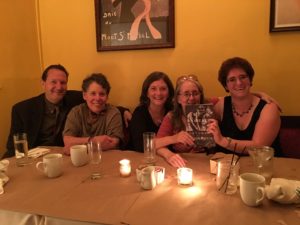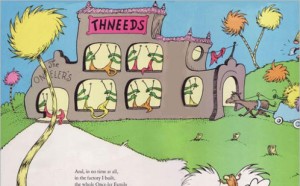This blog usually tackles (or is tackled by) serious subjects, so let’s start the year with a little humor. Over at McSweeney’s Internet Tendency, Sandra Newman’s list of “Woman Facts” satirizes gender roles and those clickbait lists of dubious scientific trivia. For instance:
A woman is born with all the exclamation points she will use in her lifetime.
*
When cornered by a predator, a woman can swell to three times her normal size, but won’t because it is unladylike.
*
The “period” is a myth devised by the 1810 Ladies’ Secret Conclave. Tampons actually serve to prevent the genie from escaping.
*
Large numbers of women can be caught by baiting a trap with a crying infant. Though only one woman may fall into the trap, hundreds of others will gather to criticize everything she does with the child.
On that note, I recognized so much of myself in this May 2015 post from British evangelical feminist Hannah Mudge’s blog, “Searching for Sunday: Motherhood, Guilt and Disillusionment”. Our sons are about the same age. I thought I was the only one who suddenly felt overburdened by the demands of church membership once I had a baby:
In 2012 I became a mother. It hardly seems possible that Sebastian is three this week, a hilarious, much-loved little ball of energy. Motherhood hit me like it hits most other women; I mulled over the shift in my identity incessantly, felt incredibly lonely, struggled with anxiety and felt as if I’d left my brain somewhere else for months on end as I cared for a child that Did Not Sleep. Unsurprisingly, I totally disengaged from church. With one eye on the baby and my weary mind struggling to cope with the noise and the crowds and the intrusion, I zoned out. When I wasn’t zoned out, all I could feel was guilt.
The modern church can be incredibly effective at making you feel guilty because you’re insufficiently involved, insufficiently on board, insufficiently motivated to do more, give more, be more. There are always more programmes, more opportunities to serve, another reminder to get better at quiet time or outreach or prayer. When you have a baby your priorities change. This doesn’t mean that you have no desire to give more, to learn more; in my case, motherhood coincided with the beginning of a deep desire to know more about theology, to delve deeply into scripture, and a growing sense of revelation in the everyday, in conversations with friends and rigorous self-analysis. But what it does mean is that you almost certainly have no time to actually do it.
In 2012 I became a mother. My mental health has had its ups and downs. I returned to work full time when my son was nine months old and I love my job. I’ve had a thirst for deep friendships, but my introvert’s brain doesn’t do well with small talk and crowds and distractions. I’ve longed for peace and quiet and a sense of the sacred and to simply be left alone. And for a good few years, I’ve been sold the idea that showing up on a Sunday, getting enthusiastic about joining in and getting something out of it is paramount. But by and large I’ve felt nothing, learnt nothing, wished for more free time and more focus, wished I’d stayed at home or gone for a walk or read a book instead.
Deep down I know that looking to find everything in 90 minutes on a Sunday isn’t the right thing to do. But I’ve still expected something – and when I’ve failed to gain anything from those 90 minutes on a Sunday, I’ve felt disillusioned and angry. Excluded because I’m not ‘on board’ and don’t even want to be, apprehensive because I’ve been desperate to talk to someone about it but worried that doing so would make me a troublemaker, get me labelled as bitter, problematic, a contentious woman…
…What if you’re reading this and thinking “This is me”? Bring it all back to God and your place in the Kingdom and where you’re at, right now. Not what you feel you should be involved in and saying yes to and not how you think you should be continually striving to do better and give more of yourself. Invest time in your family and your friends. Listen to God when you feel prompted to explore ways of worship or study or churches you might feel at home in. Remember the fact that Christianity doesn’t mean being assimilated and being just like everyone else at church, or all your Christian friends on Facebook, or having to like everything you hear on a Sunday. When that headspace starts to come back, use it wisely. And know that you are not alone.
For me personally, since I stopped saying the Daily Office this past November (with some guilt about breaking my 8-year tradition), I don’t feel as burned-out on Bible verses by the time Sunday comes around. Keeping up the connection with my church friends a couple of times a month feels right. I know that I need a new private devotional practice, Christian or otherwise, but I have to start by choosing to do less. My number-one New Year’s resolution is to spend more time in the bathtub watching Netflix.
The Binding of Isaac, Abraham’s near-sacrifice of his son in response to God’s command, is one of those Bible stories that make me doubt whether Christianity can be made survivor-friendly. Characters in my new novel-in-progress grapple with this text as they try to make sense of family trauma and religious belief. Fred Clark at the progressive Christian blog Slacktivist persuasively argues that “divine command” doesn’t exempt us from moral discernment, in this 2014 post, “Obedience is Always About Epistemology”:
I’m hearing voices. I’m hearing a voice in my head that’s telling me to kill a child.
The possibility that this is the voice of God testing my faith isn’t even going to be among the first thousand possibilities worth considering. The thousand other possibilities are all Very Bad, of course, but that one’s even worse — including and encompassing all the Very Bad possibilities that go before it.
Initially, though, I’d do what anyone would likely do if a voice in my head commanded me to kill and burn a child. I’d ignore it, desperately hoping it would go away, fearful of telling anyone that I’d ever even thought of such a thing lest they think — rightly — that I am a monster.
And if it didn’t go away? Well then I’d have myself committed. I’d remove myself from the presence of chlidren, driving to the nearest inpatient facility to inform the nice people in admissions, as calmly as possible, that I believed I was becoming a danger to myself and others. I’m hearing voices. The voices want me to do Bad Things.
No, no, no, the “pastors and apologists” say — that violates the spirit of the story. It’s about obedience, not epistemology. For the sake of the story, you must accept that you receive this command from God as an unambiguous revelation: You know with certainty it is a command from God.
But that just restates the problem, it doesn’t solve it. Obedience is always about epistemology. I cannot respond to this “divine command” as such until I know that it is, in fact, a divine command. It is not humanly possible to engage this story unless the story can explain just what it would mean to be able to know with certainty that this was an unambiguous bit of divine revelation, a clear command clearly from God.
And I cannot imagine any form of direct revelation that could convince me of that. I cannot imagine any way in which I, as a human bound by my finite human reason and my fallible human senses, could ever have access to such inhuman, infallible certainty.
The “voice of God”? Auditory hallucinations. Hearing voices in your head is a textbook symptom of many well-documented forms of mental illness. We’ve already covered what hearing such a voice giving such a command would mean and what it would require me to do.
And, no, it doesn’t make any difference to try to distinguish between a “voice in your head” and a voice outside your head. All voices are in your head — the “real” ones just as much as the delusional ones. That’s what’s so terrifying about actual auditory hallucinations. They do not sound like hallucinations — like something that’s “only in your head.” They sound exactly like any other voice you’ve ever heard.
How about giant flaming letters carved in the sky? No good. Everything we’ve just said about auditory hallucinations is also true for visual ones.
Well, what if other people hear God’s voice as well? What if everyone else hears it?
That’s to be expected, isn’t it? All of this is just confirming the likeliest possibility: I’m a very, very sick man. Paranoid and delusional, and now imagining that everyone else is saying the same horrible thing as the voice in my head.
There simply exists no form this divine revelation could possibly take that would exempt it from the fact that I, as a finite and fallible human, would be required to perceive it. And so it would always be possible that I was perceiving it wrong — that I was misperceiving it.
And one doesn’t want to kill and burn a child based on a misperception.
One doesn’t generally want to kill and burn a child at all — which brings us to the second problem here. It’s not just the form of this divine command that is a problem, it’s also the substance. The repugnant substance of this alleged divine command reinforces all of the formal reasons stated above for doubting it. The substance of the command presents a whole Wesleyan quadrilateral of reasons to conclude that it cannot be divine. Scripture, tradition, reason and experience all scream that it cannot be so.
Imagine again that scenario in which a unanimous horde of witnesses confirms that I have, in fact, been given a divine command that I cannot ignore or deny. Just what would these witnesses attesting to this divine revelation say? “God is speaking to you, Fred. God wants you to kill and burn this child. You need to do what God tells you to do.”
Whatever part of me wanted to cling to my own sanity wouldn’t reasonably conclude that this means God wants me to kill a child. A more reasonable conclusion would be to realize, in horror, that I’d stumbled into some terrifying Wicker Man scenario. These “witnesses” must be speaking of some other God. And the voice I was hearing and the fiery letters in the sky would force me to realize that their God was real.
C.S. Lewis toyed with the idea that something like this might be true. So did H.P. Lovecraft. So did whoever wrote Psalm 82. And now Molech or dread Chthulhu or raging Talos or three-crowned Cyric or whichever child-eating deity it was is after me.
So at that point, I’d be praying like I’d never prayed before, asking God — the God I worship, the God of Abraham, the God of the Gospels and the creeds – to deliver me from this evil lesser god who was attempting to claim me for his own. Monotheism would no longer be an option, but I’d still be monolatrous — faithful only to the God of gods and Lord of lords, the God revealed in Jesus, the God described in 1 John as “God is love” and the God mocked by Jonah for being “gracious and merciful, slow to anger, and abounding in steadfast love.”
Or perhaps there could be a less radical theological explanation. I don’t believe in a “literal” Satan — mainly because I don’t see such a character literally present in the biblical literature — but this overwhelming experience of voices and witnesses and flaming letters would likely cause me to re-evaluate that conclusion. If the voices and signs and wonders and attestations weren’t all just delusion, then here would be apparent evidence of the reality of some supernatural, evil being very much like the Satan figure we find in Dante and Milton and Stephen Vincent Benét and all the other canonical sources of this doctrine.
This is the most reasonable, defensible and biblical second possibility. If the voices and signs and wonders telling me to kill a child are not a form of delusional madness, then this must be Satan speaking to me.
No, no, no, say the pastors and apologists — it’s not Satan, it’s God. This is, they stress, the whole point of the story — that it’s God — and undeniably God — telling me to kill and burn a child.
I’ve got it backwards, they say. The story isn’t about Satan pretending to be God. It’s a story about God pretending to be Satan.
I’m don’t think that helps.
The bottom line here is that for all of these self-proclaimed defenders of God’s sovereignty, this story is not at all about obedience to God. It’s about obedience to them.
Because obedience, remember, is always about epistemology — about the possibility of knowing, with certainty, what it is we are commanded to do, and the possibility of knowing, with certainty, the source of that command.
They like to talk about God’s sovereignty, but the real substance of their claim has to do with their own certainty. Their own ability to access certainty and to proclaim it to and for others. We know what God has commanded, they say. We know. And therefore you must obey [what God has commanded as articulated by] us.
I appreciate this post for highlighting the connection between theology, sanity, and social control. When you persuade people to suspend their common-sense moral intuitions and empathy, this not only makes them vulnerable to authoritarian religious leaders, but also prevents them from recognizing and healing from other abuses of power in their personal lives. Because if you can’t be sure that child sacrifice is wrong, you can’t be sure of anything. To quote King Lear, “That way madness lies.” And he would know.








